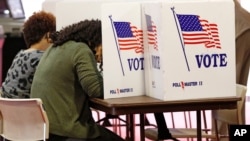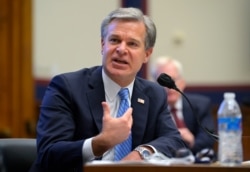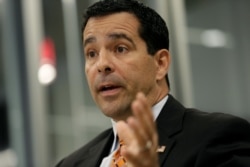FBI Director Christopher Wray told lawmakers Thursday that Russia is not letting up in its efforts to sway the outcome of the November presidential election, backing earlier assessments from U.S. counterintelligence officials that Moscow's main goal is to damage the campaign of Democratic candidate and former Vice President Joe Biden.
Wray, testifying before the House Homeland Security Committee, described the Kremlin's influence operations as "very, very active" on social media, on its own state-run media and through various proxies.
The aim of these influence operations is "primarily to denigrate Vice President Biden and what the Russians see as kind of an anti-Russian establishment," he said.
The FBI director's comments are in line with a rare public assessment in early August about threats to the U.S. election provided by the nation's top counterintelligence official, William Evanina.
But while Evanina additionally warned Russian-linked actors were "seeking to boost" U.S. President Donald Trump's candidacy, the FBI director on Thursday was not as explicit, focusing instead on the barrage of disinformation targeted by Russia and others at U.S. voters.
"What concerns me the most is the steady drumbeat of misinformation and amplification of smaller cyber intrusions," Wray said. "I worry they will contribute over time to a lack of confidence [among] American voters.
"That would be a perception, not reality. I think Americans can and should have confidence in our election system and certainly in our democracy," he added.
During lawmakers' questioning, Wray also rejected concerns about the expected increase in the use of mail-in ballots for the November election, despite repeated warnings from Trump that voting by mail will lead to massive fraud.
"We have not seen, to date, a coordinated national voter fraud effort in a major election," he said, echoing assurances given by senior U.S. law enforcement and intelligence officials who spoke to reporters on the condition of anonymity just last month.
Wray's assurances, though, appear to leave him at odds with Trump, who later Thursday sent out a series of tweets warning that the use of mail-in ballots will result in a "RIGGED ELECTION" and "lead to massive chaos and confusion!"
Antifa and US protests
The FBI director also appeared to clash with Trump, and Republican lawmakers, over antifa, a left-wing protest movement that has been increasingly visible in demonstrations that have spread across the country.
Trump has tweeted repeatedly about classifying antifa as a terrorist organization.
But Wray repeatedly shied away from that sort of description Thursday.
"We look at antifa as more of an ideology or a movement than an organization," he told lawmakers, adding there is no evidence that antifa is behind any sort of coordinated campaign to incite violence at protests that have gripped parts of the country.
"Much of the violence that we're seeing does not appear to be organized or attributed to any one particular group or movement," the FBI director said.
Instead, he described attempts by antifa and other movements, like the right-wing Boogaloo Boys, to instigate violence as ad hoc.
"We are seeing, in certain pockets, more kind of regionally organized folks coalescing, often coordinating on the ground in the middle of protests," Wray said, adding that such attempts can even cross ideological lines, such as in one incident earlier this month in which two self-described Boogaloo Boys attempted to join with the Palestinian terror group Hamas.
Wray's explanations about antifa, however, did not sit well with Republican Representative Dan Crenshaw, from Texas, who has been supportive of the president.
"It seems strange to me that we can't call it a group," Crenshaw told Wray.
"This is an ideology that organizes locally. It coordinates regionally and nationally. It wears a standardized uniform. It collects funds to buy high-powered lasers to blind federal officers," Crenshaw said. "It just seems to be more than an ideology."
But Wray said the FBI's focus is on violence and criminology, and not ideology, which is protected under freedom of speech.
"I, by no means, mean to minimize the seriousness of the violence and criminality that is going on," he said. "To be clear, we do have quite a number of properly predicated investigations into violent anarchist extremists, any number of who self-identify with the antifa movement."
US-based extremists
Wray also told lawmakers the FBI sees U.S.-based violent extremists, whether influenced by jihadist ideology or ideology emanating domestically, as the biggest threat to the country.
"Racially motivated violent extremism is, I think, the biggest bucket within that larger group," he said, noting there have been a total of 120 arrests for domestic terrorism this year.










